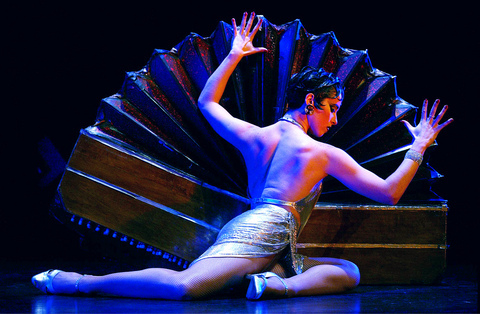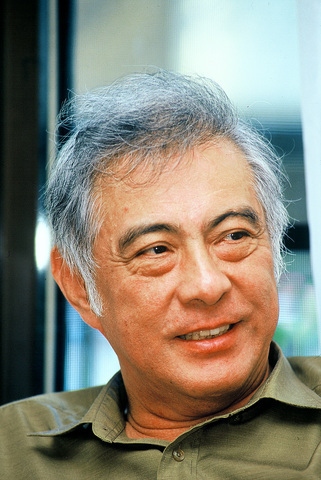Hsu Po-yun (許博允), who was born in 1944 in Japan, is one of the most fascinating figures in Taiwan's artistic
community.
Through extensive travels and experience, Hsu is well-informed and organizes events by world-class stars and troupes in Taiwan.

PHOTOS COURTESY OF NEW ASPECT FOUNDATION
His goal is to improve the quality of cultural life in Taiwan and to enlighten his compatriots.
In 1978, Hsu and his wife Fan Man-nong (
And in the almost three decades since its inception the New Aspect has put on over 6,000 events with some 20,000 artists from 88 countries having performed for more than 7 million audience members at 130 different venues in 88 cities/counties throughout Taiwan.

PHOTO COURTESY OF JIN CHENG-CAI
New Aspect has held over 100 world premier performances and countless Taiwan premiers in music.
Such impressive achievements may have made Hsu and his wife famous, but have not necessarily brought them great riches.
Hsu's enthusiasm in promoting artistic activities in Taiwan proved disastrous in 1997 when he sponsored a concert at the Chiang Kai-shek memorial hall by Luciano Pavarotti, Placido Domingo and Diana Ross.
The event called "Super Concert" was held outside and attracted an audience of some 60,000.
However, more than two thirds of the audience watched from afar and hadn't bought tickets for the concert.
The poor choice of venue for the concert almost bankrupted Hsu and he was forced to sell several of his houses to pay back bank loans, which at one time totalled NT$200 million.
Later on, he would tell his media friends and college students who attended his lectures that, "promoting the arts in Taiwan offers the least potential to make big bucks."
Despite the setback Hsu has gone on to prove his abilities.
Hsu believes that artists themselves should promote culture so that people who understand art can lead the artistic community in a proper manner, the New Idea
Hsu hails from a prominent local family. He said his childhood home was a mansion filled with many antiques.
His grandfather Hsu Ping
After graduating from high school in 1960, he learned to play the violin and studied music theory under Professor Hsu Tsang-houei
Hsu consequently took on the multiple roles of music performer, composer, impresario and cultural reformer.
On Dec. 9, he will hold a concert at the National Concert Hall to present many of his music masterpieces.
Hsu composed his first musical composition aged 19 in 1962 and his most popular work The Pipa (琵琶隨筆),written in 1975, has been performed more than 300 times in several dozens of cities throughout 30 or more countries.
His music has been well received in Japan, Korea, Hong Kong, Singapore and Malaysia.
Artists and news media in Europe have also presented Hsu's music in many different forms, including stage-shows, music performances, radio shows and movies.
Hsu is critical of the National Chiang Kai-shek Center for
extending the musical The Phantom of the Opera to a run of almost three months starting from Jan. 18.
"The long duration of a performance for one single troupe would ruthlessly take away the opportunity for a great number of local or other international artists to perform there."
Moreover, he maintains that since the center is publicly funded, it should not profit from any program it offers and should reduce ticket prices.
Hsu points out that the Really Useful Company, which is sending its cast to perform in Taiwan, is owned by an Australian who registered his company in London.
There are at least four different troupes performing The Phantom in the world and the Really Useful Company's cast is certainly not the best.
However, the center has been accused of overcharging the public by charging the highest ticket price for the musical in Asia.
The causes, Hsu said, could be that either the organizer is
charging too much, or the center is paying too high a price to the Australian company.
According to local media reports, the center paid NT$300 million for a total of 63 shows of The Phantom which puts the production cost for each show at between NT$8 to 9 million, much higher than the NT$6 million the show cost to put on in New York.
Hsu suggested that the center should, in the future, avoid
sponsoring any commercial program such as The Phantom and should only allow each group to perform for two weeks, with a possible one week extension.
Otherwise, the more than one thousand local performance groups that are desperate to stage their shows would suffer serious financial losses, and would not be able to find venues at which to perform to make enough money to survive.
In the 1980s, Hsu organized a series of performances called "New Environment of Asian Music" with his musician friends in Japan, Korea, the Philippines, Thailand and Hong Kong and was invited to deliver speeches in many countries including the US, France and Poland.
After undergoing heart surgery earlier this year he decided to hold his much delayed concert. Many of his friends including Ju Tzong-ching

That US assistance was a model for Taiwan’s spectacular development success was early recognized by policymakers and analysts. In a report to the US Congress for the fiscal year 1962, former President John F. Kennedy noted Taiwan’s “rapid economic growth,” was “producing a substantial net gain in living.” Kennedy had a stake in Taiwan’s achievements and the US’ official development assistance (ODA) in general: In September 1961, his entreaty to make the 1960s a “decade of development,” and an accompanying proposal for dedicated legislation to this end, had been formalized by congressional passage of the Foreign Assistance Act. Two

Despite the intense sunshine, we were hardly breaking a sweat as we cruised along the flat, dedicated bike lane, well protected from the heat by a canopy of trees. The electric assist on the bikes likely made a difference, too. Far removed from the bustle and noise of the Taichung traffic, we admired the serene rural scenery, making our way over rivers, alongside rice paddies and through pear orchards. Our route for the day covered two bike paths that connect in Fengyuan District (豐原) and are best done together. The Hou-Feng Bike Path (后豐鐵馬道) runs southward from Houli District (后里) while the

March 31 to April 6 On May 13, 1950, National Taiwan University Hospital otolaryngologist Su You-peng (蘇友鵬) was summoned to the director’s office. He thought someone had complained about him practicing the violin at night, but when he entered the room, he knew something was terribly wrong. He saw several burly men who appeared to be government secret agents, and three other resident doctors: internist Hsu Chiang (許強), dermatologist Hu Pao-chen (胡寶珍) and ophthalmologist Hu Hsin-lin (胡鑫麟). They were handcuffed, herded onto two jeeps and taken to the Secrecy Bureau (保密局) for questioning. Su was still in his doctor’s robes at

Mirror mirror on the wall, what’s the fairest Disney live-action remake of them all? Wait, mirror. Hold on a second. Maybe choosing from the likes of Alice in Wonderland (2010), Mulan (2020) and The Lion King (2019) isn’t such a good idea. Mirror, on second thought, what’s on Netflix? Even the most devoted fans would have to acknowledge that these have not been the most illustrious illustrations of Disney magic. At their best (Pete’s Dragon? Cinderella?) they breathe life into old classics that could use a little updating. At their worst, well, blue Will Smith. Given the rapacious rate of remakes in modern